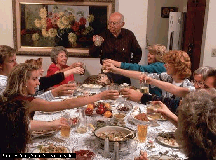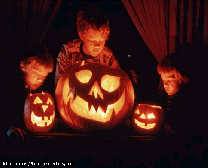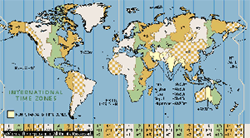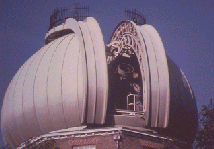 |
|
Unit 1 The summer holidays
|
|
|
|
|
|
|
 |
|
Unit1 The summer holidays
|
|
|
|
|
|
|
|
 |
|
|
 |
|
Unit 1 The summer holidays
|
|
 Thanksgiving Thanksgiving
Thanksgiving is the day on which
Americans thank God for the many good things
he has given them. It is a feast day observed
on the fourth Thursday in November, about the
time most crops are harvested in North
America. American families get together on
this day to give thanks to God, to eat, and to
remember the first Thanksgiving, which took
place long ago.
The pilgrims were a religious group who
moved from England to America in the early
seventeenth century. Their first year in
America was very difficult. Many of the
pilgrims died because they did not have enough
food and the winter was very cold, and they
were unable to grow more than enough food. To
thank God for their good year, they had a
feast for all of the pilgrims. They also
invited some of the Indians who had helped
them learn to hunt and grow food. That was the
first Thanksgiving.
Today, Thanksgiving is a family holiday.
Family members sometimes travel thousands of
miles to be together for Thanksgiving.
Traditionally, the women of the family cook a
dinner of turkey, sweet potatoes, and pumpkin
pie. Everyone is expected to eat as much as
possible, and after dinner they sit in the
living room holding their stomachs and
complaining that they ate too much!
 Halloween Halloween
--- A traditional holiday
Hundreds of years before the birth of
Christ, the Celts --- people in France and the
British Isles held a festival at the beginning
of every winter for the Lord of the Dead.
These people believed that this god ruled the
world in winter, when he called together the
ghosts of dead people. On October 31, these
spirits of the dead came back in the forms of
animals, with very bad ghosts as black cats.
At their festival on this day, people used to
make big fires to frighten the ghosts and
drive them away. This celebration was the
beginning of the holiday of Halloween.
The Romans, who ruled the British Isles
after the birth of Christ, also held a
celebration at the beginning of winter.
Because winter was harvest time, the Romans
brought apples and nuts for the goddess of
gardens. Later, the Christians added their
customs to those of the Celts and the Romans.
They had a religious holiday on November 1st
for the saints ( the unusually good people in
Christianity), which they called All Hallows'
or All Saints' Day. The evening before this
day was All Hallows' Even (“holy
evening”); later the name became Halloween.
Long ago in Britain, people used to go
to wise old women called “witches” to
learn about the future. They believed that
these witches had the power to tell the future
and to use magic words to protect people or
change them. There were many beliefs about
witches, who are now a symbol of Halloween.
For example, people believed witches flew on
broomsticks to big, secret meetings, where
they ate, sang, and danced. The Christians
tried to stop people from believing in
witches, but many uneducated people,
especially in the countryside, held on to
their beliefs.
When people came to North America from
British Isles, they brought their Halloween
customs with them. Today, Halloween is a night
when children dress up like ghosts, witches,
devils and so on. They go from house to house
in their costumes, ring doorbells and shout,
“Trick or treat!” People give them candy,
apples, gum, and nuts, and the children have a
good time. But most children have no idea that
their holiday has such a long history.
The most common symbol of Halloween is
the Jack-o'-lantern. It was believed that
jack-o'-lanterns set on porches and
windowsills cast a spell of protection over
the household while spirits of the dead wander
the Earth.
 Time
Zones, any of 24 geographic areas into which
the earth is divided for the purpose of
maintaining a standard time system. Clocks
within a given time zones are set to the same
time, which is generally one hour later than
the zone immediately to the west. Each time
zones is defined by its distance east or west
of Greenwich, England. Time
Zones, any of 24 geographic areas into which
the earth is divided for the purpose of
maintaining a standard time system. Clocks
within a given time zones are set to the same
time, which is generally one hour later than
the zone immediately to the west. Each time
zones is defined by its distance east or west
of Greenwich, England.
Until the late 1800s most towns and
cities set clocks based upon the rising and
setting of the sun. Because of the earth's
rotation, dawn and dusk occur at different
times at different places, but time
differences between distant locations were
barely noticeable because of long travel times
and the lack of long-distance communications.
 Since
the earth rotates 15 degrees of longitude per
hour, the earth's 360 degrees were divided
into 24 zones, each measuring about 15 degrees
in width. The 0° longitude line, or meridian,
was defined as a line running through the old
Royal Greenwich Observatory in Greenwich,
England. Time in each of the 12 zones east of
Greenwich increases one hour for each zone.
Time in each of the 12 zones to the west of
Greenwich decreases by one hour. The
International Date Line lies at the 180°
meridian on the opposite side of the earth
from Greenwich and divides the eastern and
western time zones. The time difference
between each side of the International Date
Line is 24 hours. Thus, a traveler heading
west across the date line loses one day while
a traveler headed east gains a day. Since
the earth rotates 15 degrees of longitude per
hour, the earth's 360 degrees were divided
into 24 zones, each measuring about 15 degrees
in width. The 0° longitude line, or meridian,
was defined as a line running through the old
Royal Greenwich Observatory in Greenwich,
England. Time in each of the 12 zones east of
Greenwich increases one hour for each zone.
Time in each of the 12 zones to the west of
Greenwich decreases by one hour. The
International Date Line lies at the 180°
meridian on the opposite side of the earth
from Greenwich and divides the eastern and
western time zones. The time difference
between each side of the International Date
Line is 24 hours. Thus, a traveler heading
west across the date line loses one day while
a traveler headed east gains a day.
|
|
|
|
|
|
|
 |
|
|
 |
|
Unit 1 The summer holidays
|
|
[基础知识]
1. 词法
(1) introduce
[说明]introduce是及物动词,作“介绍(相识)”解,常用于introduce
sb.to sb. 这一结构中。
在上下文很清楚的情况下,其中的“to
sb.”常可省去。
例如: I’d like to introduce
you to my teacher,miss Green.
我想把你介绍给我的老师格林小姐。
Please allow me to introduce Mr.
Brown (to you).
请允许我把布朗先生介绍给你们。
(2) go on
[说明]go on 后跟doing sth.表示“继续做……某事;连续不断地做某事”。
例如: He went on working till
midnight.
他一直工作到半夜。
You oughtn’t to go on living
this way.
你不应该继续这样生活。
(3) turn
[说明] turn可作名词用,表示“轮班,轮流”。
常用形式有It’s one’s turn to do
sth.“该轮到某人做某事了。”
例如: It's your turn to clean
the blackboard.
该轮到你擦黑板了。
His turn came last.
最后轮到他了。
(4) prefer
[说明]prefer是及物动词,作
“更喜欢,宁愿”解。
常用“prefer... to...”
这一结构来表示“宁愿……而不愿……”的意思。
其中to是介词,
所以就可以说prefer n. to n.
或prefer doing sth. to doing sth.
例如: Which do you prefer---
rice or noodles?
你愿意吃什么---
米饭还是面条?
I'd prefer some short stories.
我更愿意看一些短篇小说。
He prefers fish to meat.
他喜欢吃鱼而不喜欢吃肉。
I'd prefer playing outdoors to
watching TV.
我宁愿在外边玩而不愿看电视。
(5) result
[说明] result 是名词,作“结果”解。
as a result
是个固定短语,表示“由于……的结果”;“因此”。
常用来承接上文,表示因果关系。
例如: He was late as a result of
the traffic jam.
由于交通堵塞,他迟到了。
He had a bad cold. As a result, he
didn't come to school this morning.
他患了重感冒,所以他今天没来上学。
[练习题]
1. He _____ fruit ______
vegetables.
A. prefered, to B. prefers,
with
C. preferred, to D. prefers,
and
2. It's getting dark. I must _____
now.
A. leaving B. off C.go D. leave
off
3. Tom got up late this morning.
______, he didn't catch the early bus.
A. Because of B. As a result C.
As a result of D. Of course
4. In my opinion, ______.
A. he is wasting time B.
planes run faster than trains
C. it is cold in winter
D. Washington is the capital of the
States
5. --- ______is this turn?
--- It's _____.
A. Whose, me B. Whose, my C.
Whose, his D. Whose turn, hers
2. 语法句法
(1) So was my friend
Bob White. 我的朋友鲍勃·怀特也在那所学校读书。
[说明] 此句中的so意为“也”。是避免重复的倒装句,
表示所叙述的事与前面所讲述的事相同。用于肯定句中。
其句型结构是“ So + be (
have 、do等)助动词或情态动词+主语。”
例如:Li Ming had a good
holiday, so did I.
李明假期过得愉快,
我也过得愉快。
I can swim. So can my brother.
我会游泳,我弟弟也会游泳。
(2)
复习不同时态的特殊疑问句。
[说明]当疑问词作主语或主语的定语时,句子语序无须倒装。
例如:Who is that boy
over there?
主语
那边那个男孩是谁?
Whose handwriting is the
better, Bob's or Peter's?
定语
谁的书法好,鲍勃的还是彼得的?
当疑问词作表语、宾语、状语或修饰宾语的定语时,句子语序要借助
助动词或情态动词进行倒装。
例如:What is your
father?
表语
你父亲是干什么的?
He is an engineer.
他是个工程师。
What was he doing at this
time last week?
宾语
上周这个时侯他在做什么?
When did you call him
yesterday?
状语
你昨天什么时候给他打过电话?
How many Chinese words has
he learnt?
宾语的定语
他学了多少汉字?
How can you work out the
problem?
状语
你怎么样能把这道题算出来?
[练习题]
1. _____ about Mr. White, our new
teacher?
A. Who you know B. Who
do you know
C. What you know D. What
do you know
2. ----_____ your class?
----Mrs. Brown.
A. Who will be introduced B.
Who will be invited
C. Who taught you biology D.
Who is in charge of
3. I like sports very much and
______ my brother.
A. so does B. so is C. so has
D. so likes
4. Teacher: Mary, ask your partner
where he went for his holiday.
Mary: Bob,
______________________?
A. where did you go for your
holiday B. where did he go for his holiday
C. where you went for your
holiday D. where he went for his holiday
5. I finished reading three
storybooks last week. Please tell me
what you _____ at this time
last week.
A. did B. was doing C. were
doing D. have done
|
|
|
|
|
|
|
 |
|
|
 |
|
Unit 1 The summer holidays
|
|
|
[拓展知识]
|
| 1.
词法 |
| |
(1)
go on
|
| |
[说明]本身可表示“发生;进行”的含意。其后不仅可跟-ing形式;还可跟to
do形式。
go on doing sth.表示继续做原来的事情;go
on to do sth.
强调干完或停下一件事再干另一件事。此外go
on后还可跟介词with +n.的形式,表示“继续做原来没有做完的事情。”
例如:What is going on outside?
外边发生什么事了?
I suppose everything is going on all
right.
我想一切都进行得不错。
She nodded, smiled, and went on reading.
她点了点头,笑了笑,继续看书。
After finishing his work, he went on to
help us.
干完他的工作,他接着帮我们干。
I'll go on with the story where I left
off last time.
我将接着上次继续讲这个故事。 |
| |
(2)
prefer
|
| |
[说明]
prefer不仅可跟名词或-ing形式;还可以跟to
do sth.
此外prefer还可用于prefer to do
sth.
rather than do sth.这一结构,表示
“宁愿……而不愿……”的意思。
例如: He preferred to live in the
country.
他更喜欢住在乡下。
She preferred to go with us rather than
stay behind.
她宁愿和我们一起去,而不愿意留下。 |
| |
(3)
channel
|
| |
[说明]
channel不仅可表示 “水渠”,还可表示“频道;波段”。
例如: What channel is that program
on?
那个节目在哪个频道播出? |
| |
[练习题] |
| |
- After
we listened to the tape, we
_______the text.
A. went on with
B. went on reading
C. went on to read
D. will go on to read
- Bill
and Harry meet _____ the first time
_____ the beginning of term.
A. at, for B. for, at
C. on, in D. from, at
- ----Mike,
this is my friend, Jim.
---- Hi, Jim. It's very ______ to
meet you.
A. pleased B. happy C.
glad D. nice
- ---
What do you prefer to do when you
are free?
--- __________.
A. I prefer to listen to music to
watch TV.
B. I prefer listening to music to
watch TV
C. I prefer to play basketball
rather than to watch TV
D. I prefer listening to music to
playing basketball
- ---
How about watching TV now?
--- Yes, _________.
A. I do B. I'd love to C.
I would love D. I'd love to watch
|
| 2.
语法句法 |
| |
(1) “So +主语+ be / have / do …等(助动词/或情态动词)
” |
| |
[说明]
在这个句子结构中so
表示上文所说的情况“的确如此”,上下文讲的是同一人,不涉及其他人。
例如:---Your father is very busy
recently.
你爸爸最近很忙。
---So he is.
他的确很忙。
They went to Hainan for their
holidays, and so they did.
他们去海南度假去了,他们的确去了。
|
| |
(2)
“Neither / Nor + be / have / do…等(助动词/或情态动词)+主语” |
| |
[说明]
这句结构中的neither / nor意为“也不”。也是避免重复的倒装句,
表示所叙述的事与前面所讲述的事相同。但用于否定句中。
例如:---He has never been to the
States.
他从没去过美国。
---Neither have I.
我也没去过。
---My house isn't big.
我的房子不大。
---Nor is mine.
我的也不大。 |
| |
[练习题] |
| |
- If
they don't support the plan,
_______.
A. so do I B. so will I C.
neither do I D. nor will I
- Mother
asked me to get up early this
morning, and ______.
A. so she did B. neither did
she C. so I did D. so
did I
- Kate,
_____ your new dress, and I will
take you to the party.
A. put on B. puts on C.
wear D. wears
- ---How
are you? Ben.
---I am very ____, thank you.
A. fine B. good C. well
D. kind
- What
about _____ the movie this evening?
A. to see B. to go C. going D. going
to
|
|
|
|
|
 |
|
Unit 1 The summer holidays
|
|
|
|
|
|
Notes of Senior
English Book 1 Unit 1 |
词语辨析:holiday(holidays),leave,vacation,off都有“假日(期)”的意思,但含义用法并不相同。
holiday(holidays)一般指“休假”
Tom and I are going to have a holiday. 我和汤姆准备去度假。
I've already had my holidays this year. 我今年已经度过假了。
During a holiday in Sweden,I found this note on my car.
在瑞典度假期间,我在我的车子上发现了这张字条。
Postcards always spoil my holidays. 明信片总是弄得我过不好假日。
My holidays passed quickly,but I did not send any cards to my friends.
我的假日过的很快,但是我一张明信片也没有寄给朋友。
注:have a (或one's)holiday 度假,during a holiday 在一次假期中。这种用法的holiday 总用单数形式,但并不只是“一天”假。 复数形式的holidays 泛指“假日”,如summer holidays 暑假。但“Sunday is a holiday ”中的holiday 却是“一天”的假。
She has gone to Canada on vacation. 她到加拿大去度假。 (= holiday)
The city was covered with holiday clothes.(喻义时只能用holiday,不能用vacation.)(vocation职业、天命)
holiday一两天的假/holidays长假/vacation一般不用复数,另有“(法庭)休庭期”之意。
leave 指“请假”,被批准后离开自己的工作的一段时间
He stays at home on sick leave. 他请了病假呆在家里。
He asked for a six months' leave. 他请了6个月的假。
She's been given sick/ compassionate/ maternity leave
她获准休病假/事假/产假。
而 vacation 在英国指大学的寒暑假或法定不工作的日子,美国可指任何假日(期)
The students are planning how to spend their summer vacation.
这些大学生在计划着怎样过暑假。
Mr. Fuller is on vacation now. 费勒先生在度假。
So as to be away from work or duty:离开工作或职责:
They took a day off.他们休息一天take a day off休假一天
Spent away from work or duty: 休假的在离开职责中度过:
My off day is Saturday.我的休息日是星期六
an off day休假日off hours空闲的时间
three days off an off season淡季
for the first time/ the first time(名词可以作状语,如the moment...)
IT信息技术;[资讯科学]Information Technology的缩写。
Stop acting as though you were it.不要夜郎自大。
it[it]pron.[指心目中或上下文中的人或事物]这, 那, 它
Go and see who it is.去看看是谁。It's me.[口](=It is I.)是我。
[指无生命的东西, 也可指动物与性别不详的幼儿]它
They got a baby and it was a ten-pounder.
他们生了个十磅重的婴孩。
[作无人称动词的主语]表示“时间、气候、距离等”
[作先行代词, 引导后面的短语或从句]这, 这一点
It is no use trying.试也无用。
It is certain that we shall succeed.我们一定会成功。
[作先行代词, 用在强调句型中]
It was here that I first met him.这就是我初次与他见面的地方。
It is I that am fortunate.幸运的是我。
[接在某些由名词变来的动词后, 无实义, 构成习惯性动词短语]
[口语中用作某些动词或介词的含糊宾语]
Go it while you are young.趁你年轻努力干吧。
You'll catch it!你可小心点儿!(警告用语)
You are in for it.这下你可得干到底了(或这下你可要倒霉了)。
term n.学期, 期限, 期间, 条款, 条件, 术语
a term of office 任期 to get a term of seven years in prison 被判7年徒刑
He was made captain of the football team for a term of one year.
他被推选为足球队队长,任期一年。
名词;术语technical terms 专门名词,术语
If you agree to my terms -- free meals and good wages — I will work for you. 如果你同意我的条件,免费用餐并给高薪,我就为你工作。
in the long term从长远的观点看in the short term从眼前的观点看
on equal terms同等
The chairman dismissed the meeting.主席宣布散会。
well[wel]n.井vi.涌出adj.健康的, 良好的, 适当的
adv.好, 满意地, 充分地, 彻底地, 有理地, 适当地, 夸奖地int.唔, 咳,嘿; 唷,好啦,喂, 好吧,喔; 那么n.好, 美满; 令人满意的事物I wish you well.愿你称心如意。
channel n.海峡, 水道, 沟, 路线,信道,频道vt.引导, 开导, 形成河道
The English Channel is between France and England.
英吉利海峡在英国和法国之间。
with regard to关于 With kind regards谨此致候
Give the family my best regards.祝您全家幸福
Please give my regards to your mother.请向你妈妈问候。
expressionn.表达, 表情, 脸色, 声调, 腔调, 措辞
read with expression有感情地朗读
chemist n.化学家, 药剂师 chemistry n.化学
chemical adj.化学的 n.[常pl.] 化学制品, 化学药品
camp n.野营,营地,兵营
introduce:The chairman introduced the speaker to the audience.
主席把讲演者介绍给听众。
使熟悉,带领提供给(某人)某事物的初步认识或初次经历:
introduced me to weightlifting.带领我认识举重
introduce a humorous note in a speech先讲几句幽默话作为讲演的开场白foreign captial introduction引进外资 a letter of introduction介绍信
prefer vt.(preferred; preferring)宁可, 宁愿(选择); 更喜欢; (比较起来)喜欢...(而不喜欢...)(to) prefer doing to talking喜欢做而不喜欢说
enjoy/practise/finish/keep/mind/can't help doing
practice n.实行, 实践, 实际, 惯例, 习惯, 练习, 实习, 开业
theory理论 social practice社会实践
practice , exercise , drill 都含“实践”、“练习”的意思。
practice 指“为一目的或使技能达到熟巧而进行体力或智力方面的反复实践”, 如:He does his practice on the violin every day.他天天练小提琴。We must put our plans into practice. 我们必须将计划付诸实行。
exercise 指“体力或智力的反复运用以发挥力量或增进健康”, 如:grammatical exercises语法练习。floor exercises 自由体操 morning exercises早操
drill 指“反复不断地进行某种特殊练习, 以锻炼身心而养成正确的习惯”, 如:pattern drills句型操练。
result n结果;效果
As a result, there is often trouble in American families.
因此,美国家庭中常常会出现麻烦事。
成败;输赢结果the football results 足球赛的结果
The result of the game was five-nothing.比赛结果是五比零。
result vi.由...而造成(from)结果; 致使; 导致(in)
Nothing has resulted from his efforts.他的努力终成泡影。
Acting before thinking always results in failure.做事不先考虑总会导致失败。
every是指数目不确定的许多人[物]中间的每一个, 它的“总合”意义很重;each则指一定数目中的每一个, “个别”意义较重。every只能用作形容词, 因此只有在与名词连用或构成复合词时, 才能用作主语或宾语;each可用作形容词, 也可用作代词, 直接作主语或宾语, 如:each of us, each of the students, each student; every one of us, every student.
From each according to his ability, to each according to his work.
各尽所能,按劳分配。
There are new houses on each side of the street.街道两边有新楼房。
Each student in our class has a dictionary.我们班每位同学都有一本词典。
set about doing开始做,着手处理 set off出发,启程 (= set out)
The children set off for school.孩子们上学去了。
set up建立(事业);成立(组织)
set off,set out 这两个短语动词都有“出发”和“动身”的意思,都可以解释为start to move或begin a journey。
然而set off的原义是使爆炸(cause to explode)
set out 的原义是着手做(出发, 开始)
注:set out 在用来表示“着手做”时,后面总是跟动词不定式。
|
|

 Thanksgiving
Thanksgiving Halloween
Halloween Time
Zones, any of 24 geographic areas into which
the earth is divided for the purpose of
maintaining a standard time system. Clocks
within a given time zones are set to the same
time, which is generally one hour later than
the zone immediately to the west. Each time
zones is defined by its distance east or west
of Greenwich, England.
Time
Zones, any of 24 geographic areas into which
the earth is divided for the purpose of
maintaining a standard time system. Clocks
within a given time zones are set to the same
time, which is generally one hour later than
the zone immediately to the west. Each time
zones is defined by its distance east or west
of Greenwich, England. Since
the earth rotates 15 degrees of longitude per
hour, the earth's 360 degrees were divided
into 24 zones, each measuring about 15 degrees
in width. The 0° longitude line, or meridian,
was defined as a line running through the old
Royal Greenwich Observatory in Greenwich,
England. Time in each of the 12 zones east of
Greenwich increases one hour for each zone.
Time in each of the 12 zones to the west of
Greenwich decreases by one hour. The
International Date Line lies at the 180°
meridian on the opposite side of the earth
from Greenwich and divides the eastern and
western time zones. The time difference
between each side of the International Date
Line is 24 hours. Thus, a traveler heading
west across the date line loses one day while
a traveler headed east gains a day.
Since
the earth rotates 15 degrees of longitude per
hour, the earth's 360 degrees were divided
into 24 zones, each measuring about 15 degrees
in width. The 0° longitude line, or meridian,
was defined as a line running through the old
Royal Greenwich Observatory in Greenwich,
England. Time in each of the 12 zones east of
Greenwich increases one hour for each zone.
Time in each of the 12 zones to the west of
Greenwich decreases by one hour. The
International Date Line lies at the 180°
meridian on the opposite side of the earth
from Greenwich and divides the eastern and
western time zones. The time difference
between each side of the International Date
Line is 24 hours. Thus, a traveler heading
west across the date line loses one day while
a traveler headed east gains a day.